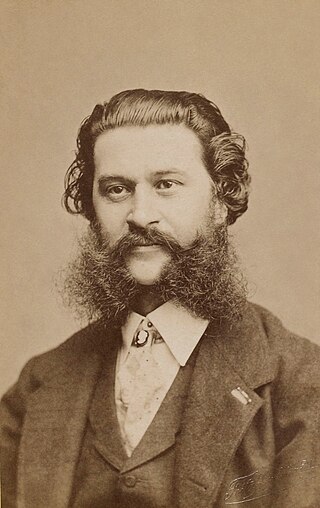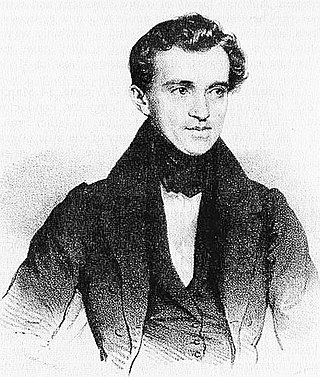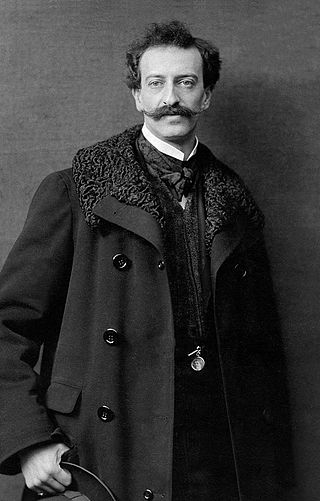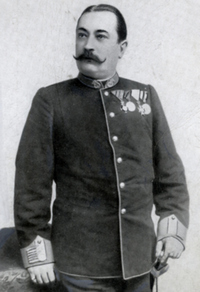Related Research Articles

Johann Baptist Strauss II, also known as Johann Strauss Jr., the Younger or the Son, was an Austrian composer of light music, particularly dance music and operettas as well as a violinist. He composed over 500 waltzes, polkas, quadrilles, and other types of dance music, as well as several operettas and a ballet. In his lifetime, he was known as "The Waltz King", and was largely responsible for the popularity of the waltz in Vienna during the 19th century. Some of Johann Strauss's most famous works include "The Blue Danube", "Kaiser-Walzer", "Tales from the Vienna Woods", "Frühlingsstimmen", and the "Tritsch-Tratsch-Polka". Among his operettas, Die Fledermaus and Der Zigeunerbaron are the best known.

Johann Baptist Strauss I, also known as Johann Strauss Sr., the Elder or the Father, was an Austrian composer of the Romantic Period. He was famous for his light music, namely waltzes, polkas, and galops, which he popularized alongside Joseph Lanner, thereby setting the foundations for his sons—Johann, Josef and Eduard—to carry on his musical dynasty. He is best known for his composition of the Radetzky March.

Franz von Suppé, born Francesco Ezechiele Ermenegildo de Suppé was an Austrian composer of light operas and other theatre music. He came from the Kingdom of Dalmatia, Austro-Hungarian Empire. A composer and conductor of the Romantic period, he is notable for his four dozen operettas, including the first operetta to a German libretto. Some of them remain in the repertory, particularly in German-speaking countries, and he composed a substantial quantity of church music, but he is now chiefly known for his overtures, which remain popular in the concert hall and on record. Among the best-known are Poet and Peasant, Light Cavalry, Morning, Noon, and Night in Vienna and Pique Dame.

Oscar Nathan Straus was a Viennese composer of operettas, film scores, and songs. He also wrote about 500 cabaret songs, chamber music, and orchestral and choral works. His original name was actually Strauss, but for professional purposes he deliberately omitted the final 's'. He wished not to be associated with the musical Strauss family of Vienna. However, he did follow the advice of Johann Strauss II in 1898 about abandoning the prospective lure of writing waltzes for the more lucrative business of writing for the theatre.

Die Herzogin von Chicago is an operetta in two acts, a prologue, and an epilogue. The music was composed by Hungarian composer Emmerich Kálmán with a libretto by Julius Brammer and Alfred Grünwald. It premiered in Vienna at the Theater an der Wien on April 5, 1928, and played for 372 performances. The work was presented in out-of-town tryouts in Newark, New Jersey and Springfield, Massachusetts by the Shuberts in 1929, but it did not make it to Broadway. The piece was forgotten until 1997, when the Lubo Opera Company performed it in concert in New York, after which Light Opera Works of Illinois performed the work in 1998 in a fully staged version with a new translation by Philip Kraus and Gregory Opelka. In 1999, Richard Bonynge made a recording of the work, which revived international interest in it.

Johann Maria Eduard Strauss III was an Austrian composer whose father was Eduard Strauss, whose uncles were Johann Strauss II and Josef Strauss, and whose grandfather was Johann Strauss I. Born in Vienna, he was unofficially entrusted with the task of upholding his family's tradition after the dissolution of the Strauss Orchestra by his father in 1901. His talents were not fully realized during his lifetime as musical tastes had changed in the Silver Age with more popular composers such as Franz Lehár and Oscar Straus dominating the Viennese musical scene with their operettas, although his uncle, Johann Strauss II, supervised his development as a musician, a fact disputed by Eduard Strauss.

Robert Elisabeth Stolz was an Austrian songwriter and conductor as well as a composer of operettas and film music.

Alphons Czibulka was an Austro-Hungarian military bandmaster, composer, pianist and conductor.

Alfred Maria Willner was an Austrian writer, philosopher, musicologist, composer and librettist.
Bruno Bernhard Granichstaedten was an Austrian composer and librettist. He composed sixteen operettas and music for various films. He contributed the song "Zuschau'n kann i net" to the musical play The White Horse Inn. He emigrated from Austria, ending up in the United States of America in 1940, where he was only able to earn his living by playing the piano at night clubs.

Der letzte Walzer is a Viennese operetta in three acts, with music by Oscar Straus, to a libretto by Julius Brammer and Alfred Grünwald. It opened at the Berliner Theater in Berlin on 12 February 1920 and starred Fritzi Massary. It was first given in Vienna at the Theater an der Wien on 5 October 1923, with Betty Fischer, Max Hansen, and Richard Tauber in leading roles.

Marta Eggerth was a Hungarian actress and singer from "The Silver Age of Operetta". Many of the 20th century's most famous operetta composers, including Franz Lehár, Fritz Kreisler, Robert Stolz, Oscar Straus, and Paul Abraham, composed works especially for her.

Leo Ascher was an Austrian composer of operettas, popular songs and film scores.

The Carltheater was a theatre in Vienna. It was in the suburbs in Leopoldstadt at Praterstraße 31.
Walzer aus Wien is a singspiel pasticcio in three acts, libretto by Alfred Maria Willner, Heinz Reichert and Ernst Marischka, music by Johann Strauss II (son), arranged by Erich Wolfgang Korngold and Julius Bittner, first performed at the Stadttheater in Vienna on 30 October 1930.

Heinrich Reinhardt (1865–1922) was an Austrian composer. He died on 31 January 1922 in Vienna and is buried at the Döbling Cemetery.

Julius Brammer was an Austrian librettist and lyricist. Some of his better-known works were written in conjunction with the composers Emmerich Kálmán, Oscar Straus, Leo Ascher, Edmund Eysler and Robert Stolz.
Operetta films are a genre of musical films associated with, but not exclusive to, German language cinema. The genre began in the late 1920s, but its roots stretch back into the tradition of nineteenth century Viennese operettas.
References
- Sources
- Most of the material in this article is from the German Wikipedia article
- Raimar Wieser (Hrsg.): Heinrich Strecker und Baden (Heinrich Strecker and Baden) Gesellschaft der Fruende Badens, (Association of the Friends of Baden), Baden 1993.
- Raimar Wieser: Liebes Wien, du Stadt der Lieder. Heinrich Strecker und seine Zeit (Lovely Vienna, City of Songs. Heinrich Strecker and His Times) Amalthea Verlag, Wien 1997, ISBN 3-85002-405-9.